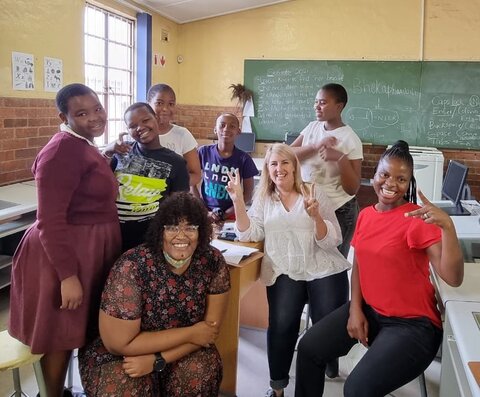ACACIA & INCLUSION

Author: Gioia Mosler (ACACIA Research and Programme Manager)
Date: 27/02/2023
ACACIA included people from seven cities across sub-Saharan Africa: Blantyre in Malawi, Durban in South Africa, Harare in Zimbabwe, Kampala in Uganda, Kumasi in Ghana, Lagos in Nigeria, and Moshi in Tanzania. Each of these study centres in Africa is home to a wide range of diverse communities with many different backgrounds, cultures, and languages. From the beginning of the project it was therefore important to us to be inclusive and to make a special effort to engage disadvantaged groups and communities in our research. In the following paragraphs I have summarised some of our approaches to inclusivity.
Selecting schools
During our project we collected data from teenagers, between 12 and 14 years of age, at schools. When we sampled the schools, our aim was to include children who were representative of the city, and especially to also include marginalised communities or areas. We made sure that all categories of schools in the area were represented, such as day and boarding schools, girls only, boys only and mixed schools, state, religious, and private schools. Some sites found that certain school types were harder to engage with than others, and our researcher in Lagos, Nigeria says: ‘We had a lot of disappointment from the big private schools in the affluent part of the city.’
Providing extra help where needed
In some locations the teams realised that several students could not read or write sufficiently to fill in the surveys. We decided that someone from the study team would be available to assist students who were unable to read or write. Parents who were unable to read or write could bring a witness of their choice to complete consent forms. Special arrangements were made to meet with working parents outside their working hours to share study details and to obtain consent.
Talking money
The teams provided adequate compensation for travel costs to the schools for data collection outside the school routine, e.g. for parents attending focus groups. It was important to get the level of compensation right: Too little would not be fair to participants who had expenses. Too much will make it harder for projects with fewer funds to match the payments.
Communication, Communication, Communication!
We realised early that communicating in preferred languages, and respecting individual’s viewpoints, gave potential participants or their parents the confidence to open up to our research team members and to participate. Community leaders, such as traditional and religious leaders and other trusted community members were included in study sensitisation activities, where appropriate. This helped foster trust of community members which positively impacted recruitment. In settings where local languages were common, all communication and information was translated to include people who felt more comfortable in their language. Even when people were very reluctant to engage, having a conversation about their underlying reasons was always worthwhile, and provided possibilities for us to understand any concerns or barriers to take part, and how we could further improve our engagement with communities.